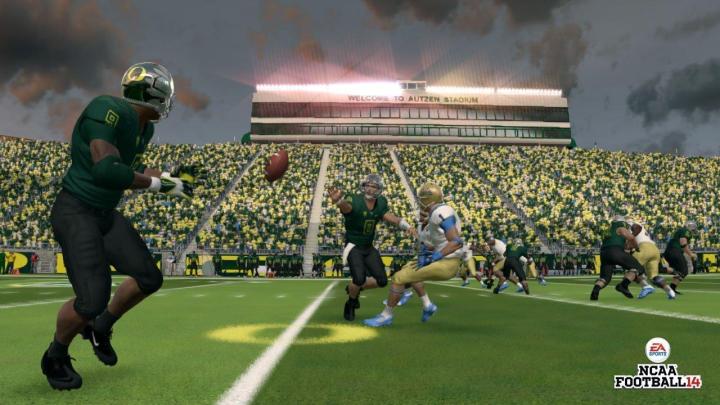
Following a settlement between Electronic Arts and the Collegiate Licensing Company, and the current and former student athletes suing them (as well as the NCAA), the NCAA has now filed a suit of its own against EA and the CLC. The college sports organization alleges that both EA and the CLC breached their contractual obligations, according to USA Today.
The lawsuit seeks to bar the proposed settlement that EA and the CLC had agreed to with the athletes. It would also drag both companies back into the messy litigation with the NCAA that began when former UCLA basketball player Ed O’Bannon brought a suit against the three organizations. O’Bannon’s suit was later joined by former Arizona State and Nebraska football player Sam Keller.
According to the suit filed in Georgia on November 4, the NCAA alleges that both EA and the CLC breached contractual obligations directly relating to the original lawsuit from O’Bannon. One of the claims is that EA did not offer enough liability insurance to cover “pending third-party claims, including for attorneys’ fees that the NCAA has already incurred in defending against those claims.”
The suit would further require EA to cover any future judgments against the NCAA involving EA’s NCAA-licensed games, and it would force EA and the CLC to cover any “reasonable” legal expenses – including those accrued from this new suit itself.
The CLC is also listed in the suit for allegedly failing to grant the NCAA “access to documents and records that the NCAA is entitled to inspect,” as well as not adequately advising EA on the contractual obligations that it allegedly breached.
For the last few years the NCAA, EA, and the CLC have provided a united front in the face of growing criticism and legal pressure over their use of student athletes’ likeness for profit, without compensating the athletes. Earlier this year though, the NCAA elected not to renew its license agreement with EA, effectively ending the NCAA Football games after 15 years. EA vowed to carry on with the help of the CLC and through individual license agreements with schools and conferences, despite resistance from both.
In September, EA introduced Andrew Wilson would be the new CEO, and shortly after the company announced that it would end its college football franchise completely after 20 years, and that it had tentatively settled all outstanding lawsuits with the student athletes.
Along with the O’Bannon and Keller suit that brought the NCAA together with EA and the CLC, EA was also the subject of lawsuits by former West Virginia football player Shawne Alston and former Rutgers player Ryan Hart. Following the appointment of Wilson as EA’s CEO – either because of his involvement or simply to tie up loose ends – EA and the CLC offered $40 million in settlement for all three suits, which seemed to end the matter for the two companies, but left the NCAA as the sole defendant in the O’Bannon and Keller suit.
The NCAA claims that the settlement offer was conducted without its involvement or notice, and that EA and the CLC refused to provide the necessary legal documents. Due to the settlement, the NCAA claims that it “has been harmed, continues to be harmed, and will suffer future harm, from EA’s and CLC’s unlawful actions, including irreparable harm.”
Meanwhile the CLC, which is headquartered in Georgia, claims that this is really an issue between EA and the NCAA. “CLC is caught in the middle of a dispute between NCAA and EA which should not involve us,” Andrew Giangola, a spokesman for CLC told USA Today. “CLC has valued relationships with both the NCAA and EA and while we hope they can soon resolve their dispute, we see no reason for CLC to be involved.”
Editors' Recommendations
- Don’t buy the new MSI Claw handheld — at least not yet
- Heroes of Middle-Earth isn’t afraid to play with Lord of the Rings canon
- E3 isn’t dead just yet as ESA plans physical show for 2023
- Say goodbye to FIFA and hello to EA Sports FC
- Mario Kart 9 isn’t happening yet, but 8 is getting new DLC


